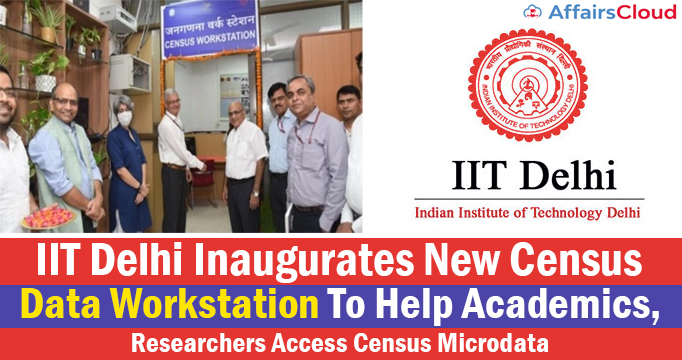
The Indian Institute of Technology (IIT) Delhi inaugurated a new Census Data Workstation at the Economics Lab in the Department of Humanities and Social Sciences at IIT Delhi in New Delhi (Delhi) on July 6, 2022.
- Dr. Vivek Joshi, Registrar General and Census Commission of India, inaugurated the Census Date Workstation.
- The Census Data Workstation would facilitate academicians and researchers have access to Census Microdata and raise awareness about the massive amount of data generated during Census operations in India.
A memorandum of understanding (MoU) was also signed at the workstation’s inauguration between Professor Ganguli of the IIT Delhi and Ajay Garg from the Directorate of Census Operations (DCO) Delhi.
- It has been agreed to explore the potential use of Artificial Intelligence (AI), Machine Learning (ML), and advanced data science techniques in the digital census as well as for compiling data for birth and death registrations and other purposes.
Deadline for Freezing Administrative Boundaries Extended: Census 2022 Pushed to 2023-24
The Registrar General of India (RGI), Ministry of Home Affairs (MoHA), notified all States/Union Territories (UTs) in June 2022 that the deadline for freezing administrative boundaries had been extended to December 31, 2022, thereby ruling out a census in 2022. The previous deadline for jurisdictional changes was June 30, 2022.
- The census 2021 or 16th National census survey, has now been postponed again to 2023–2024. The most recent census or 15th National census survey was carried out in 2011.
- Also the 16th Census of India will be digital census and will be completed before 2024.
According to rule 8(iv) of the Census Rules, 1990, the boundaries of administrative units must be frozen starting on the date notified by the Census Commissioner, which cannot be earlier than one year from the Census reference date.
- The Government of India (GoI) notified certain amendments to Census rules in March 2022, allowing citizens to self-enumerate in the Census and National Population Register (NPR). In addition, the census will be preceded by a house-listing exercise.
Reason for Extending the Deadline:
i. The COVID-19 pandemic, which has increased probability of spread, has been highlighted by the RGI as the cause for the deadline extension.
- The states/UTs were also already focused on/involved in accelerating the COVID-19 vaccination campaign in India.
ii.The RGI was tasked with conducting the enumeration for the NPR, which serves as a precursor to the preparation of the National Register of Citizens(NRC), between April 1, 2020, and September 30, 2020.
- While the Citizenship Amendment Act (CAA) sparked debate about NPR and NRC, which several states openly opposed, the Census date was indefinitely postponed in early 2020 as a result of the COVID-19 pandemic in India.
iii. The deadline was initially extended to December 31, 2020, and then to March 31, 2021, June 30, 2021, December 31, 2021, and finally to June 30, 2022.
Census 2011
The Census 2011 is the 15th National census survey conducted by the Census Organization of India. Mr. C. Chandramouli is the Commissioner & Registrar General of the Indian 2011 Census.
- The 2011 Indian National Census has been conducted in 2 phases – house listing and population.
- The national census survey covered all the 28 states of the country and 7 Union territories including 640 districts, 497 cities, 5767 tehsils & over 6 lakh villages.
- The Indian Population Census 2011 covered a number of parameters during the survey. These parameters include population, growth rate in population, rate of literacy, density of population, sex ratio and child sex ratio (0-6 years).
Interruptions to the Census of India in the past
i. In 1941, colonial India had a disturbance as a result of World War 2. Even then, all of the data collection work was completed by just missing the tabulation process.
ii.Census was not allowed to be missed during the rough times of 1961, when the fear of Chinese aggression was high, or in 1971, when India was actively involved in the liberation of Bangladesh.
iii. The schedule for the 2021 Census has been delayed for the first time in the history of more than 130 years of census operations in India.
Census in India
Definition: A population census is the total process of collecting, compiling, evaluating, analyzing and publishing or otherwise disseminating demographic, economic and social data pertaining, at a specified time, to all persons in a country or in a well delimited part of a country.
i.The Census Organization was conducted as an ad-hoc basis until 1951.All the censuses since 1951 were conducted under the 1948 Census of India Act.
- SardarVallabhbhai Patel, India’s then-Home Minister, spearheaded the census initiative in 1951.
ii.A census is performed under the provisions of the Census Act 1948, and data is gathered in India every ten years (decennial).
- Census has been conducted by the Registrar General and Census Commissioner of India under the Ministry of Home Affairs, Government of India.
- First Non-synchronous Census: It was conducted in India in 1872 under British Viceroy Lord Mayo.
- First Synchronous Census: The first synchronous census was conducted under British rule in 1881.
iii. According to Article 246 of the Indian Constitution, the census of the population is a union subject. It is listed in the seventh schedule of the constitution as serial number 69.
Census Organization of India :
Registrar General & Census Commissioner, India – Dr. Vivek Joshi, I.A.S.
Headquarters – New Delhi,Delhi.




